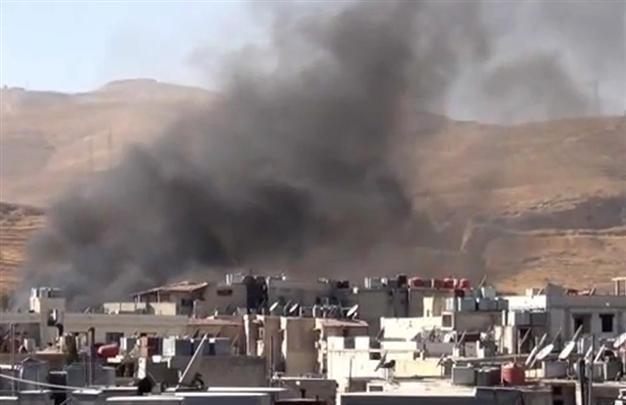Car bomb kills 20 outside mosque near Damascus as fears mount for trapped Syrians
DAMASCUS - Agence France-Presse

AFP Photo
A car bomb outside a mosque near Damascus killed at least 20 people on Oct. 25 as a top U.N. official expressed mounting concern over hundreds of thousands of trapped civilians.
Dozens of people were wounded in the explosion in the town of Suq Wadi Barada, said the Britain-based Syrian Observatory for Human Rights, which relies on a network of activists and other witnesses.
The town is under rebel control, but troops loyal to President Bashar al-Assad were positioned just outside it, it said. Anti-regime activists blamed the attack on government forces, while state news agency SANA said "the car exploded while the terrorists were packing it with explosives."
The Observatory said at least three of the dead were children, and SANA said a seven-year-old child was killed.
In other violence an army ambush east of Damascus killed some 24 rebels, the Observatory said, as SANA put the toll at 40.
The outskirts of the capital have seen fierce fighting in recent days as al-Assad's troops try to tighten the noose around rebel areas.
The army has closed in on Eastern Ghouta, a ring of suburbs besieged for months, which was targeted in an August chemical attack that killed hundreds of people and almost led to punitive U.S. strikes.
U.N. and U.S. officials have expressed concern about Eastern Ghouta and other besieged Damascus suburbs, following reports of severe food shortages and rising malnutrition.
Call for 'sustained pressure' for trapped civiliansU.N. humanitarian chief Valerie Amos on Oct. 25 called on the Security Council to put "sustained pressure" on the Syrian regime to allow access to some 2.5 million civilians trapped by the conflict.
"Words, despite their ability to shock, cannot really paint a picture of the grim and gruesome reality of Syria today," Amos told the 15-nation council.
The Observatory described a similarly dire situation in the central city of Homs, where it said some 3,000 civilians are trapped in an area sealed off by regime forces for more than a year.
"Three thousands civilians, among them 500 aged over 70, are living exclusively off the little food that had been stored in the besieged districts of Homs," said Observatory director Rami Abdel Rahman.
Further north, in the Sfeirah district near Aleppo, some 130,000 Syrians have fled non-stop heavy bombing in a "massive exodus" this month, according to Doctors Without Borders, which has staff on the ground.
Some 115,000 people have been killed since the start of Syria's uprising in March 2011 and millions have been displaced.
A U.N.-commissioned report released Oct. 25 said more than half of Syria's population is now living in poverty and warned that the economic devastation wrought by the war could last for years.
In the latest sign of Syria's growing misery, U.N. agencies said they were racing to vaccinate children against a host of diseases amid fears of a polio outbreak, which would be the country's first since 1999.
The mushrooming humanitarian crisis, and the initial success in implementing a U.S.-Russian accord to dismantle Syria's chemical arsenal, have spurred renewed efforts to convene peace talks.
But despite pressure from its Western and Arab backers, the fractured Syrian opposition has yet to decide whether to attend the so-called Geneva 2 conference proposed for next month.
The opposition has insisted that al-Assad step down as part of any political settlement, which Damascus says is off the table.
